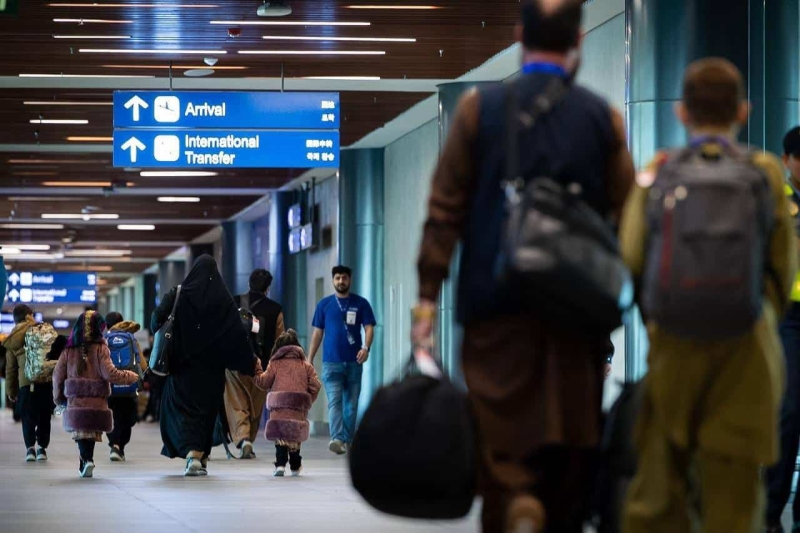TRANSIT. Afghan nationals transiting to process their Special Immigrant Visas (SIVs) in the Philippines arrive on Monday (Jan. 6, 2025). The Philippines will host up to 300 Afghan nationals who worked at the US mission for 59 days while they complete their SIV applications at the United States Embassy in Manila before resettling in the US. (Photo courtesy of the US Embassy in Manila)
MANILA, Philippines – The Afghan nationals transiting to process their Special Immigrant Visas (SIVs) in the Philippines have arrived on Monday, a stay expected to last no longer than 59 days – visa or no visa, the Department of Foreign Affairs (DFA) confirmed.
In total, the country will host up to 300 nationals – at least half of them minors – while they complete their SIV applications at the US Embassy in Manila before resettling in the United States.
The DFA issued the appropriate Philippine entry visa to these applicants in line with current rules and regulations, Foreign Affairs Spokesperson Ma. Teresita Daza said.
“All applicants completed extensive security vetting by Philippines national security agencies. They also underwent full medical screening prior to their arrival in the Philippines,” she said in a statement on Monday.
In an on-background briefing Dec. 20 last year, a senior Filipino official said the deal between the Philippines and the US allows the latter to finish the entire project within a 100-day period upon the arrival of the first applicant, with each Afghan national only authorized to stay in the country for a maximum of 59 days.
If an applicant fails to secure an SIV within that period, the US government will then “promptly relocate” the concerned Afghan national to “another platform or to another country.”
“So, the processing of each applicant by the US Embassy here in Manila should be completed within that 59-day period,” the official said.
“(The agreement) will cover only a group of 300 applicants, all of whom should be processed and relocated, removed in no more than 100 days from the date of arrival of the first applicants,” the official added.
The group was supposed to arrive in two batches, but last-minute changes brought it down to a single flight. The arrival was first set for Saturday and Sunday but inclement weather reset the schedule.
The Afghan nationals would be housed in a billet facility financed by the US government. They can leave the premises just once for their interview at the US Embassy.
The official reiterated that all applicants underwent “full security vetting” by both the Philippine and US governments.
Under the Philippine-US agreement, the latter will shoulder all the necessary services for the Afghans, including food, housing, medical care, security and transportation to complete visa processing.
Staff contracted by the US government will provide security in the premises, all of whom would be under the direct supervision of the Philippine National Police.
“(The Philippine side) was very clear that they don’t want, as much as possible, this to be an additional burden on other government agencies, and that’s the same reason why we’ll ask the US also to contract out the management of the platform, rather than have DSWD (Department of Social Welfare and Development) have the responsibility over the platform,” said the official.
Without disclosing the location, the official also clarified that the Afghans would not be housed in any of the Enhanced Defense Cooperation Arrangement sites.
Five ‘nots’
Kabul fell under Taliban rule in August 2021, prompting a chaotic pullout of American forces days before the US completed its withdrawal after a 20-year war in Afghanistan.
Thousands of Afghan nationals who worked at the US mission were left behind.
In July 2024, the Philippines and the US formally signed an agreement to temporarily house them — a deal ratified by President Ferdinand R. Marcos Jr. in September the same year.
A State Department official, in the same briefing, said they had asked dozens of US partners to serve as a temporary site for SIV processing and was elated that Manila agreed, given the size and capacity of the US visa center in the country.
Apart from the Philippines, the US has “platforms” or State Department Office of Coordinator for Afghan Relocation Efforts-operated (CARE) facilities in three other countries.
“These are people we know, these are people we trust, and these are people that we owe the opportunity in the US that we fell short on in their country,” the US official said.
“We’re very grateful to you, this government, you Filipino people, for helping us to fulfill our promise to them that we would give them a pathway to another opportunity and safety,” the official added.
The senior Filipino official, meanwhile, clarified that no pressure nor “any negotiating leverage” was used against the Philippines in this arrangement, describing the deal as a show of the two nations’ “shared commitment” to provide the concerned Afghan children, women, and men an opportunity to start anew and to rebuild their lives.
The official reiterated the following:
The arriving Afghans are not refugees;
It is not a permanent agreement and will terminate at the 100-day mark after the arrival of the first applicant;
It is not a US demand but a request;
It will not be a burden to nor cost the Filipino people or the Philippine Government a single peso, and;
The Afghans are not considered dangerous to Philippine society and to the communities in which they will be hosted temporarily.
The Filipino official added that the two nations’ intelligence communities are in close coordination for the project.
“This project is one more demonstration of why the partnership of our two governments and the friendship of our peoples shall always be enduring, because even in the most difficult and challenging of circumstances, we are always able to find ways to work together as sovereign equals in fighting for or pursuing our shared values,” the official said.


